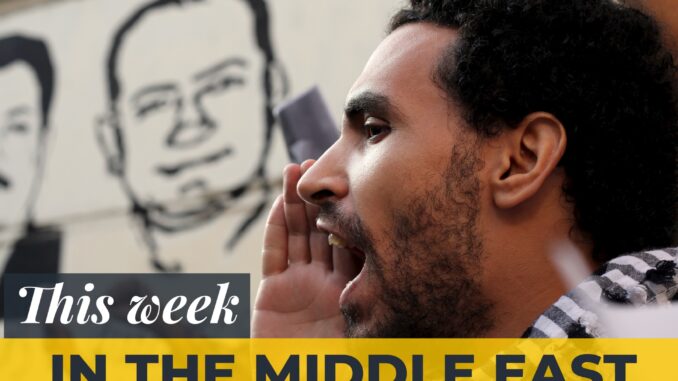
Egypt’s red lines triggered strikes and talk of cancellations – but also some pardons. Protests against a controversial judicial reform in Israel culminated in a “day of disruption”. And regional leaders have been busy flitting about the globe, signing deals and holding talks. Here’s the Middle East this week:
A silver lining in Cairo’s crackdown
Discontent swirls in Egypt, as the state cracked the whip on a number of different fronts, from academic to cultural. However, it reversed course with the sentencing of Patrick Zaki, a rights researcher who had been studying in Italy. A day after he was sentenced to three years in prison, accused of spreading false news, Egypt’s President Abdel Fattah el-Sisi pardoned him alongside prominent lawyer Mohamed el-Baqer.
Concurrently, it was reported US rapper Travis Scott has been banned from holding a concert at the foothills of the Giza pyramids. The Egyptian Musicians Syndicate allows many international artists to perform there, but said Scott’s music would “contradict the identity of the Egyptian people”. Concert producer Live Nation Middle East, however, disputes the cancellation, saying the show is going ahead as planned.
Still, Scott has upset some Egyptians too: social media users launched a campaign to cancel his concert, saying he holds an ‘anti-Egyptian Afrocentrism agenda’. Many Egyptians view the theory that the ancient Egyptians were Black as rewriting history.
And against the backdrop of Egypt’s economic crisis, BBC workers in Cairo are striking, saying they are underpaid compared to BBC staff in other countries. The journalists claim they face “deteriorating living conditions”, as the country reels from the ongoing economic impact of Russia’s invasion of Ukraine.
Israel’s ‘day of disruption’
In Israel, weeks of anti-government protests continue to swell. And at its forefront are Israeli military veterans and reservists, leading the charge against the government’s controversial judicial reforms. In fact, more than 10,000 reservist soldiers, including members of the elite intelligence unit 8200 and air force pilots, are threatening to boycott their reservist duty.
The protests, which have drawn thousands over the months, also included this past week what demonstrators called a “day of disruption“, which prompted 45 arrests. Thousands waved Israeli flags, blocking highways and briefly mobbing the stock exchange in hopes of scuppering legislation slated for final voting next week.
The judicial overhaul is also why Biden held off on inviting Israeli Prime Minister Benjamin Netanyahu to the United States for an official visit later this year. But on Tuesday, the Israeli leader currently at the helm of the country’s most far-right government yet, finally got the invitation.
It’s a deal
The region has been in a frenzy of diplomatic talks and deals for months. This week, European Union leaders and the Tunisian government finally signed a hotly-anticipated agreement, a double-edged one to help resuscitate Tunisia’s crippling economy while it curbs undocumented migration to Europe. Yet Black refugees are still being pushed out “at gunpoint“, no indication yet that the funds will help it better manage its borders.
Meanwhile, Turkish President Recep Tayyip Erdogan embarked on his three-country trip to the Gulf, where he hoped to lure in some foreign investment. The trips proved to be a success. Erdogan signed a lucrative deal to sell Turkish drones to Saudi Arabia, and secured $50 billion in deals during his UAE visit.
Elsewhere, in Syria’s continued normalisation into the Arab fold, Iraq’s Prime Minister Mohammed Shia al-Sudani met with Syrian President Bashar al-Assad in Damascus during the first trip of its kind to the war-torn country since the 12-year conflict began. And Israeli president Isaac Herzog went to the United States to meet with President Joe Biden and address Congress, a visit to solidify ties as Washington increasingly dishes out criticisms of Israeli abuses against Palestinians, even as there is still pushback from the Democratic and Republican party establishment against criticism of Israel.
Feel-good news of the week
In the arena of women’s sports, the region made leaps this week. Heba Saadieh spoke to Al Jazeera about making history to become the first Palestinian – male or female – to referee in a World Cup.
And while Ons Jabeur didn’t win the Wimbledon final, she still stole the hearts of many in her native Tunisia and beyond, nicknamed the North African nation’s “Minister of Happiness“.
Briefly
UN’s Yemeni oil tanker operation: What you need to know.
Life as a resistance fighter in Jenin: ‘Only death can stop us’.
Living in ‘an oven’: Heatwave grips displacement camps in Syria.
Mass graves discovered in Darfur as Egypt hosts Sudan summit.
Iran’s ‘morality police’ return as authorities enforce hijab rule.
Quote of the Week
“I’m so proud to be first-ever Palestinian referee, male or female, in the World Cup […] I hope I can open this door for others, for Palestinian women referees – and men also – to be selected in the future.” -Heba Saadieh telling Al Jazeera what it’s like becoming the first Palestinian to referee in a World Cup.
A ‘day of disruption’ in Israel and regional leaders in a frenzy of deals and talks – here’s the Middle East this week.
ENB Top News
ENB
Energy Dashboard
ENB Podcast
ENB Substack



